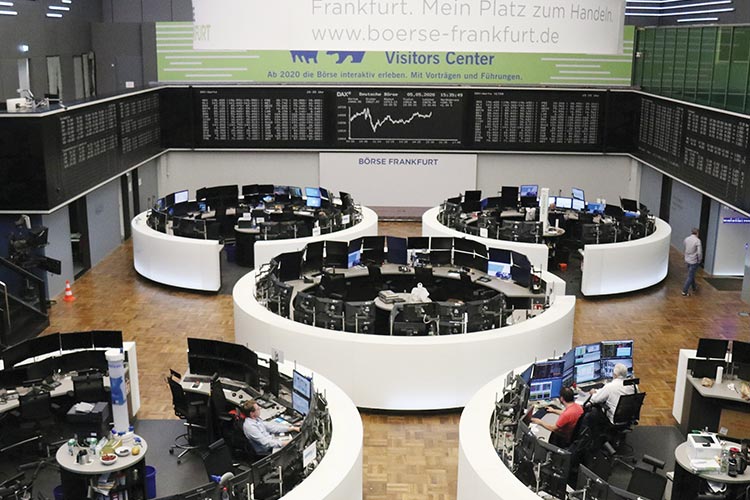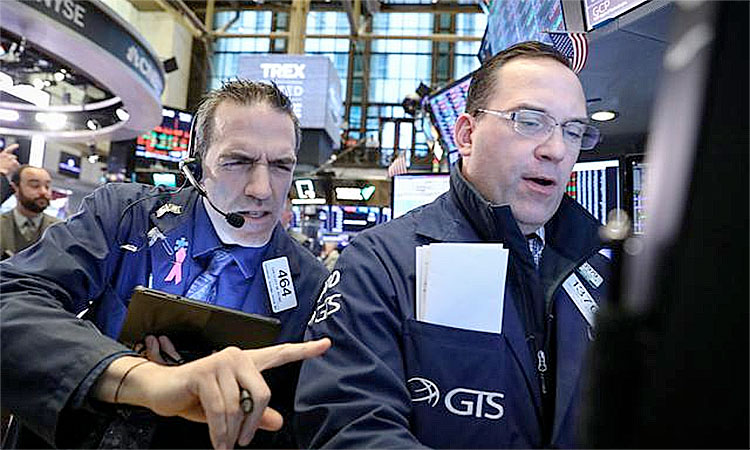Global stock markets rise, oil cools after dramatic post-new year moves

A Tesla China-made Model 3 vehicle owner sits inside the car during a delivery event at Tesla’s Shanghai factory on Tuesday. Reuters
Brent crude futures fell 44 cents to $68.48 a barrel, having been as high as $70.74 on Monday, while US crude dropped 34 cents to $62.93. European equities meanwhile rose as much as 0.7%, tracking similar gains in Asia. Technology stocks were among the top picks in Europe, mirroring trends in the US overnight.
MSCI’s broadest index of Asia-Pacific shares outside Japan recouped almost all of Monday’s losses. Stock futures for the S&P 500 firmed 0.1%.
“Geopolitical risk has always felt much worse for markets in the heat of the moment than it does in hindsight, but it’s always possible that the next one will bring us into a different era,” Deutsche Bank strategist Jim Reid said.
On Monday the mood began to calm, helping US shares recover ground. The Dow ended 0.24% higher, the S&P 500 0.35% and the Nasdaq 0.56%.
Marija Veitmane, a senior strategist at State Street, said she sticks to her expectation of a slight improvement in economic and earnings outlook.
“The world is well stocked with oil and can stomach short disruptions, while large US shale production should soften its impact,” said Veitmane, brushing aside worries that an oil price spike would dent global growth.
On Tuesday emerging markets, which had been hit hardest by spiking oil prices, bounced back, with stocks up 0.4%. That left the MSCI world equity index, which tracks shares in 49 countries, just 0.5% from a record high.
“Markets got a lift from the lack of follow-through (after the air strike) as yesterday progressed, and by the end of the session had actually staged a reasonable recovery,” Reid added.
Safety plays were out of favour, with gold retreating to $1,569.41 an ounce, after scaling a near seven-year peak overnight. Euro zone government bond yields edged up from around three-week lows.
The calmer mood also saw the yen lose much of its safe-haven gains, with the dollar bouncing to 108.38 yen from a low of 107.75 hit on Monday.
Against a basket of currencies, the dollar drifted off to 96.752 but stayed well above a recent six-month trough of 96.355.
The euro and sterling were trading slightly lower ahead of this week’s vote in Britain’s parliament on Prime Minister Boris Johnson’s European Union withdrawal deal.
Bitcoin, the world’s biggest cryptocurrency, broke above $8,000 overnight and is up 13% since the US drone attack in Iraq last week. Though it is not seen as a safe-haven asset given its wild swings, the surge has coincided with the equities sell off. Oil prices on Tuesday surrendered some gains made over the previous days as investors reconsidered the likelihood of immediate supply disruptions.
Brent crude was down 41 cents or 0.6% at $68.50 a barrel at 1122 GMT, while US West Texas Intermediate (WTI) crude was at $62.95, down 32 cents or 0.5%.
Prices surged during the previous two sessions, with Brent reaching its highest since September, while WTI rose to its strongest since April.
The gains followed fears of escalating conflict and potential Middle East supply disruptions after the Jan. 3 drone strike in Baghdad that killed Qassem Soleimani, head of Iran’s elite Quds Force. Iran has vowed a harsh revenge.
“We still believe in the absence of retaliation or disruptions that oil prices will trend lower over the course of the first quarter of 2020, with the market remaining well supplied over the first half,” ING analysts said in a note.
Consultancy Eurasia Group said Iran is likely to focus more narrowly on US military targets instead of energy targets.
“That’s not to say it won’t continue low-level harassment of commercial shipping or regional energy infrastructure, but these activities will not be severe,” it added.
Julius Baer analyst Carsten Menke said the Iranian regime was “quite rational and strategic”.
“The costs of direct military confrontation are prohibitive, and disrupting oil flows would alienate loose allies such as China and India,” he said.
“The closure of the Strait of Hormuz, a key chokepoint of global oil flows, remains a very unlikely event.” However, the United States Maritime Administration website renewed its warning about threats to US commercial vessels from Iran and its proxies in the Gulf and surrounding area.
Prices also fell despite higher compliance among the Organization of the Petroleum Exporting Countries (OPEC) on meeting production quota curbs aimed at reducing supply.
OPEC members pumped 29.50 million barrels per day (bpd) last month, down 50,000 bpd from November’s revised figure, according to a Reuters survey published on Monday.
US crude oil stockpiles likely dropped for a fourth week last week as exports ramped up, although refined products stocks were expected to have risen, a Reuters poll showed on Monday.
Six analysts estimated on average that crude stocks had fallen by 4.1 million barrels in the week to Jan 3.
Agencies







